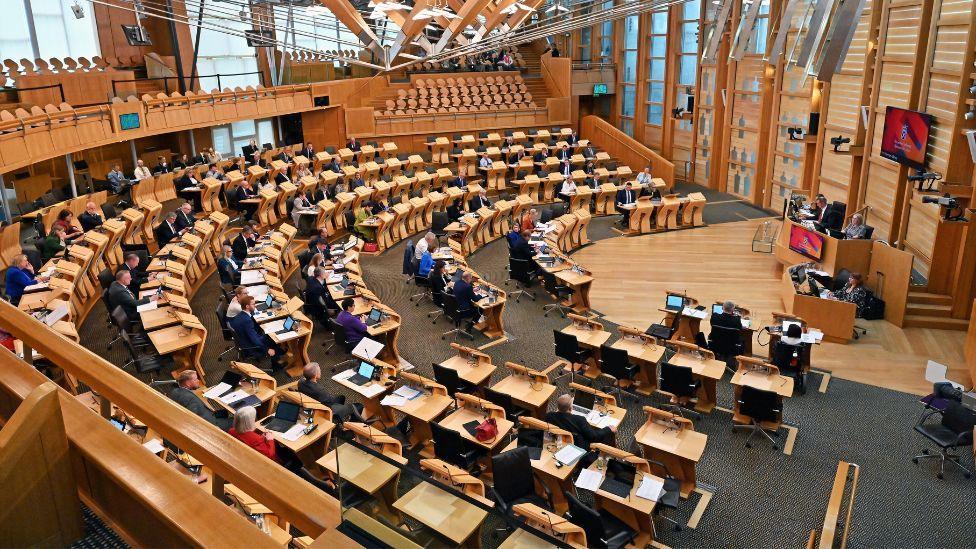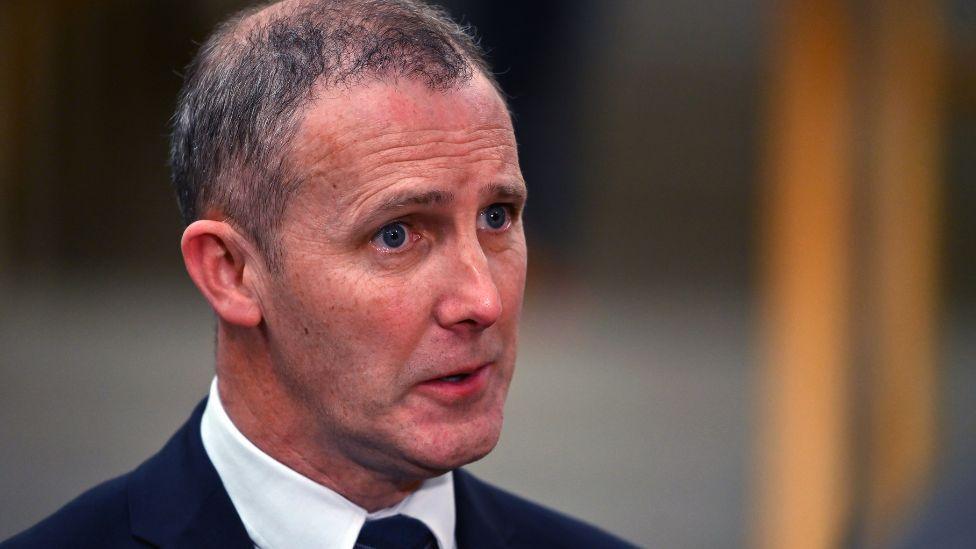Plan to allow voters to remove MSPs backed by parliament

Currently, only MSPs that have been sentenced to more than 12 months in prison are automatically disqualified from parliament
- Published
The Scottish Parliament has backed a bill that would allow constituents to effectively sack their MSP.
Unlike at Westminster, where MPs can be removed by local voters, there is no recall mechanism at Holyrood.
MSPs can only be permanently expelled from parliament if they are sentenced to more than a year in jail.
A members' bill, tabled by Reform MSP Graham Simpson, would seek to change this by introducing a recall process and lowering the threshold for automatic disqualification from Holyrood.
MSPs backed the general principles of the Scottish Parliament (Recall and Removal of Members) Bill in a stage one vote, with 81 votes in favour, 35 abstentions and no votes against.
MSPs across the chamber acknowledged that the bill would require significant changes before a final vote, which will have to be held by March next year if it is to pass before the end of the parliamentary term.
How could MSPs be removed from the Scottish Parliament?
Under the proposed legislation, voters could remove MSPs from their seat if they were suspended from Holyrood for at least 10 sitting days, or if they were sentenced to up to six months in prison.
This would be done via recall petitions, which are already used at Westminster.
Simpson - who became Reform's sole MSP in August after defecting from the Conservatives - rejected arguments that parliamentarians who switch parties after being elected should be subject to recall.
For constituency MSPs, 10% of eligible voters in their constituency would be required to back a recall petition for it to proceed.
For regional, or list, MSPs, the same proportion of votes would be required in their region (including at least 10% in at least three constituencies within it).
If the recall process was successful, the MSP's seat would be considered vacant, triggering a by-election if they were a constituency representative.

Graham Simpson, who defected from the Conservatives to Reform earlier this year, tabled the members' bill
For a list MSP, the bill proposes two options.
If they announced that they wanted to stand for re-election, a poll would be held solely on the question of whether they should be returned to parliament.
If not, their seat would go to the next person on their party's list at the previous election. If an independent MSP was recalled, their seat would remain vacant until the next election.
However, Simpson told parliament during the stage one debate that he intended to amend the recall mechanism for regional MSPs.
Instead of a petition, voters in the area would be invited to vote to either retain or remove their MSP, with a simple majority in favour of either option required.
Simpson suggested this could allay concerns about the cost of recall petitions, after Holyrood's standards committee warned that, under his plans, it could cost almost £2.75m to recall a regional MSP and about £430,000 to recall a constituency MSP.
Automatic disqualification
Simpson's bill proposes lowering the threshold at which MSPs are automatically disqualified from parliament to a six-month custodial sentence.
However, the Reform MSP has noted that the use of this provision would be "very rare" due to a presumption against short prison sentences in Scotland's criminal courts.
MSPs could also be expelled from parliament if they fail to physically attend for 180 days without a "valid reason".
Several parliamentarians raised concerns about this measure.
Asked for further detail during the stage one debate, Simpson told MSPs: "If you're perfectly fit and able to come in [to parliament], you should come in."
He added it was not "unreasonable" to expect a member to attend Holyrood at least once every six months.
Simpson said he knew "serious questions" about the bill had to be answered.
He suggested that parliament could scrap the non-attendance rule and the measure lowering the automatic disqualification threshold from a 12-month jail sentence to a six-month sentence.
An amendment by SNP MSP Kevin Stewart calling for parliament to agree a complaints and sanctions process as part of the bill was also passed.
What are the rules at Westminster?
At Westminster, constituents can remove their MP, external via a recall petition if they have been convicted of a crime and sentenced to prison, been suspended from the House of Commons or if they misled parliament about expenses.
For the petition to proceed, 10% of eligible constituency voters need to back it.
The mechanism was used to eject former SNP MP Margaret Ferrier from her Rutherglen constituency after she broke Covid lockdown restrictions.
The Welsh government has also tabled a bill that would create a recall system in the Senedd.
Calls to set up a similar mechanism at Holyrood intensified last year amid a scandal surrounding former health secretary Michael Matheson and an £11,000 data bill racked up on his parliamentary iPad while he was on a family holiday to Morocco.
After initially telling MSPs he had only used the device to do constituency work, Matheson later told parliament that his sons had used it to watch football.
Matheson, who resigned from government and apologised to parliament, was given a record Holyrood ban of 27 sitting days, with his salary withdrawn for 54 days.

Michael Matheson was given a record ban from the Scottish Parliament
Graeme Dey, minister for parliamentary business, said the government supported the general principles of Simpson's bill on the condition that the regional recall process was amended to strike the right balance between "complexity and cost".
He also said he wanted rules relating to campaigning funds and donations added into the provisions of the bill.
Martin Whitfield, speaking on behalf of the standards committee, recommended that parliament back the bill, but said "fundamental" issues had to be addressed at stage two.
The committee had raised concerns about lowering the automatic removal threshold below a 12-month jail sentence and requirements for physical attendance in parliament.
'More questions than answers'
Conservative MSP Craig Hoy said his party was not opposed to the general principles of the bill. But he warned attempts to widen the scope of the legislation could lead to it being "hijacked for purposes that may undermine the rationale" for it.
Labour's Richard Leonard said his party backed the bill in principle but said it raised "more questions than answers".
He urged MSPs to ignore "shallow arguments" about the cost of the proposals and called for a "compassionate" approach to MSPs who are unable to physically attend parliament.
Green MSP Patrick Harvie said he would abstain in the vote because he did not believe the bill was "fixable".
He warned an attempt to create such a recall mechanism could be "politicised" and "weaponised", while also suggesting that MSPs who switch parties should be subject to recall.
However, Liberal Democrat leader Alex Cole-Hamilton said such a measure could effectively "shackle" MSPs to a party.
He also argued that the bill should be expanded to cover MSPs who are barred from working with children and vulnerable adults.

The idea of introducing a recall system at Holyrood is widely viewed as a good idea.
Those in favour say a person guilty of misconduct would be sacked from any other job, so why should it be any different for politicians?
But while MSPs agree in principle with Graham Simpson's proposal, things start to get a little tricky when it comes to the details.
Sticking points include how the recall process would work for MSPs elected on the regional list as opposed to constituencies, and plans to remove MSPs who don't show up at Holyrood for six months or more.
Simpson has made it clear he's prepared to make some pretty big changes to his proposals - and the government has indicated a willingness to work with him on those.
But perhaps the biggest challenge facing this legislation is time - with so many amendments needed, and with parliament finishing up for the election in March - it's going to need a big cross-party push to get over the finish line.